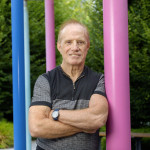When the boogie man is among us, we humans tend to point fingers. So it’s no surprise to me that many gay, bisexual and other men who have sex with men who do not have HIV (or think they do not) point fingers at those of us who do have HIV. We’re all only human.
After all, I was once HIV negative. I haven’t forgotten what it was like to be afraid of contracting HIV. Unfortunately for me, that fear became reality. Fortunately for most, that fear is never realized.
For too many, that fear is a heavy burden. For some, they believe that fear is as bad as having HIV (trust me, it’s not). For a few, that fear becomes irrational.
The viral divide between HIV-negative and HIV-positive gay men has existed since the beginning of the AIDS pandemic. However, it does seem to me that the divide is just as bad now as it has ever been.  Acknowledging the viral divide exists is the first step toward bridging it. To that end, I applaud blogger Rich Juzwiak at Gawker for diving head first into the topic. “Please Don’t Infect Me, I’m Sorry” is the title of his post. As an HIV-negative gay man, he shares his personal struggles with staying HIV negative and with dating HIV-positive gay men:
Acknowledging the viral divide exists is the first step toward bridging it. To that end, I applaud blogger Rich Juzwiak at Gawker for diving head first into the topic. “Please Don’t Infect Me, I’m Sorry” is the title of his post. As an HIV-negative gay man, he shares his personal struggles with staying HIV negative and with dating HIV-positive gay men:
[T]he chances are that I have hooked up with an HIV-positive guy or five and didn’t know it. Maybe I didn’t know it because he didn’t know it. Maybe I didn’t know it because he was a liar. Maybe I didn’t ask...getting tested is never less than horrifying, no matter how regularly I do it...
I think I’m HIV negative, but since the virus can three months to show up in blood, I can’t really be sure. In fact, none of us who are sexually active can be sure - except for those who are HIV positive.
Therein lies the hypocrisy in turning down a potential hookup who a) knows his status, and b) is honest about it in favor of one who doesn’t or is lying about it. That kind of discrimination is motivated by fear of the known while taking an agnostic approach to the unknown. It’s especially foolhardy considering that guys who know they are HIV-positive tend to be healthier and with lower viral loads than guys who don’t know they have it and are going untreated. The kind of optimism that assumes someone’s word is as good as a hard copy of a test result is potentially life-altering.
And yet, I’ve turned down guys who are open about their positive status. I watched the onset of AIDS in the ’80s through the confused eyes of a child. I had it drilled into me that this was a disease to stay far, far away from. I also know better than to sleep with someone who announces himself as HIV positive. Or knew. Now I’m not exactly sure what to think. I feel guilty and scared, but not necessarily in that order.
Juzwiak goes on to share his experiences not dating and dating certain HIV-positive guys and the lessons he learned.
An interesting point that I hadn’t thought much about before Juzwiak pointed it out is the “East vs. West Coast divide” on dating guys with HIV. A friend of his from San Francisco told him that, generally speaking, East Coast gay guys are much more uptight about dating guys with HIV. No reasons for such a difference were offered. But as an East Coast guy myself, perhaps that may have something to do with my perception about how bad the divide is.
I do have a teeny, tiny bone to pick about Juzwiak’s numbers on how many U.S. men who have sex with men (MSM) have HIV. He says that using CDC figures he estimates 1 in 14 U.S. MSM have HIV. In a blog post last year, I used CDC figures but arrived at an estimate of 1 in 10. We’ll agree to disagree on that point. He was correct in citing 1 in 5 U.S. MSM in 21 U.S. major cities have HIV.
Whatever the numbers, I believe the fact that so many gay men have HIV should motivate gay men who do not have HIV to be more educated about the virus and less judgmental about their fellow travelers.








46 Comments
46 Comments